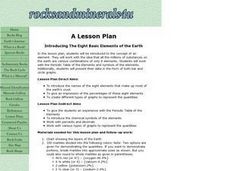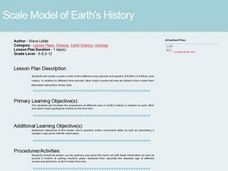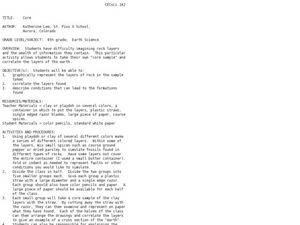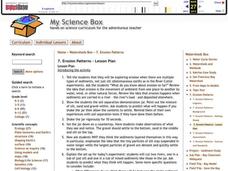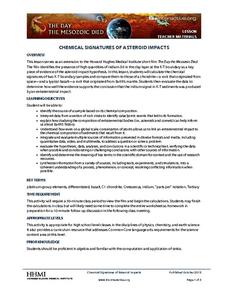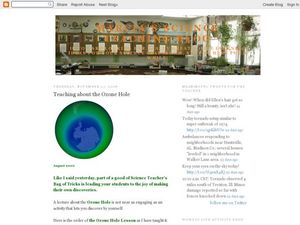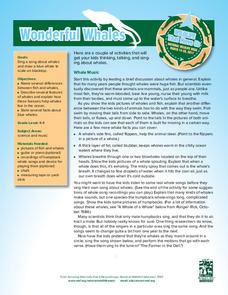Curated OER
Earthquake Science Project
Students simulate the Earth's plates moving like an earthquake by using newspaper and soil. In this earthquake lesson plan, students push and pull the newspaper together that has soil on top and observe what happens.
Curated OER
The Rifting of Pangaea and the Gettysburg Battlefield
Eleventh graders analyze and interpret an animated model of Earth’s rifting processes. In this Earth Science lesson, 11th graders connect Earth’s rifting processes with the Earth’s surface in the Gettysburg battlefield. ...
Curated OER
Plate Tectonics: An "Eggs"periment
Students investigate plate tectonics by observing a cracked egg shell. In this Earth science lesson, students draw borders of continents on an egg shell, only to watch it crack in a glass. Students record the breakup of the...
Curated OER
Understanding the Layers of the Earth
Fourth graders explore the three layers of the Earth describing the composition, thickness, and temperature of each layer. Layers are compared and contrasted and data unearthed placed into graphic organizers.
Curated OER
Eight Basic Elements of the Earth
Students identify the concept of an element and work with an idea that all of the millions of substances on the earth are various combinations of only 8 elements. They work with the Periodic Table of the Elements and symbols of the...
Curated OER
A Scale of the Earth
Students create a scale model of the different eras, periods, and epochs of Earth's 4.6 billion year history. In addition to different time periods, other major events will also be added to the model from fabricated radioactive decay...
Curated OER
Core
Eighth graders take their own "core sample" with clay and/or play-dough and correlate the layers of the earth.
Curated OER
Structure of the Earth
Sixth graders examine the layers of the Earth and the changes that take place on a daily basis. They look at the layers of a boiled egg to relate them to the layers of the Earth.
Curated OER
Styrofoam Earth
Students examine how there are three layers inside the Earth. They design their own model of the layers of the Earth with a Styrofoam ball. They illustrate the layers inside the Earth with crayons.
Curated OER
The History of Rock and Roll
Seventh graders examine how the different layers of rock show the history of the Earths surface. In this rock lesson students divide into groups and complete an activity using clay.
Curated OER
Pangaea Puzzle
Students explore plate tectonics and the formations of the Earth's surface and why maps are distorted. In this Earth's surface instructional activity students complete a lab and answer questions.
Curated OER
Take a Stab!
Young scholars construct an experiment to test the rigidity of compressed air and its strength. In this earth science lesson plan, students are divided into groups, and by putting their thumb over the end of a straw, use the compressed...
Curated OER
Ozone Hole - Changes in the Stratosphere
Halting the depletion of the hole in the ozone layer has been one of humanity's happy recoveries from previous damage done to the environment. Meteorology masters muse the Montreal Protocol and examine data on changes in the ozone....
Curated OER
Earth's Plate Tectonics
Students identify the different layers of the Earth. In this earth science lesson, students create a model of the crusts and continents. They explain how plates movement cause earthquakes and volcanoes.
Curated OER
Plate Tectonics: Kindergarten Lesson Plans and Activities
This unit focuses primarily on plate tectonics and plate boundaries surrounding continents. It contains pre- and post-lab sections that walk young geologists through plate movements in order to visualize what's going on inside Earth.
Curated OER
A Model of Three Faults - Part One
Students construct a fault model using the Fault Model Sheet imbedded in this plan. They create a 3 dimensional model of the Earth, and use dashed lines to illustrate where the fault lies. A discussion of faults follows the completion of...
Curated OER
Erosion Patterns
Middle schoolers explore erosion when there are multiple types of sediments. They view a soil separation demonstration jar before and after agitation to determine how and why the layers settled. In addition, they conduct experiments with...
NOAA
Where There's Smoke, There's ...
A remotely operated vehicle approaching a volcano was engulfed by molten sulfur where the plumes of fluids contained the highest concentrations of aluminum ever recorded. This isn't science fiction or an April fools joke, though it did...
Howard Hughes Medical Institute
Chemical Signatures of Asteroid Impacts
What killed the dinosaurs and how do scientists know? Your high schoolers can examine these fascinating questions with a geochemical lens using the engaging 33-minute video, the accompanying data interpretation, and some thoughtful...
Curated OER
Teaching About the Ozone Hole
A PowerPoint and an accompanying worksheet introduce young meteorologists to the hole in the ozone layer. Another handout provides a coloring and graphing activity which examines the changes in the ozone. There are also links to...
Curated OER
Wonderful Whales
Primary marine biologists consider the largest living animals on Earth, the whales. Introduce them to general anatomy, unique adaptations, and behaviors. Teach them to sing a song that will help them remember some of these facts....
Curated OER
The Water We Drink
Third graders relate that the quality of their drinking water is subject to the condition of the environment and water found in streams and creeks in their community. They track the travel of a wad of paper from a student's desk to a...
Curated OER
Structure of the Earth
Sixth graders define atmosphere and hydrosphere, explore through experimentation how the atmosphere was formed, and describe the layers of the Earth's atmosphere and their distances.
Curated OER
Candy Quakes
Eighth graders, using a candy bar, gum, and Twizzlers, demonstrate the effects of deformational forces on the earth's crust. They examine the processes of rock and fossil formation.






